

TeachingEnglish. British Council. LearnEnglish Teens - British Council. LearnEnglish Kids - British Council. Teachers on Pinterest su Pinterest. TeachingEnglish.
TeachingEnglish. Willy Cardoso: Classroom based teacher development. About the webinar.

Action Research - Stop, Start, Continue. I get students to brainstorm all the kind of things I as a teacher do and things which we do in class.
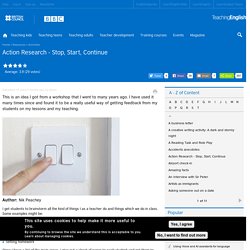
Some examples might be: speaking in pairsplaying gamesexplaining grammarsetting homework Once I have a list of the main areas, I give out a sheet of paper to each student and get them to draw three columns on the page. Reflective teaching: Exploring our own classroom practice. By collecting information about what goes on in our classroom, and by analysing and evaluating this information, we identify and explore our own practices and underlying beliefs.
This may then lead to changes and improvements in our teaching. Reflective teaching is therefore a means of professional development which begins in our classroom. Why it is importantBeginning the process of reflection Teacher diary Peer observation Recording lessons Student feedback What to do next Think Talk Read Ask Conclusion Why it is important Many teachers already think about their teaching and talk to colleagues about it too. TeachingEnglish. TES - Find and sell teaching resources. If you need an instant boost of energy in your English lessons right now, then this is the program for you! – Genki English.
Teachers.Net – TEACHERS – Education resources, Teacher chat, lesson plans, teaching jobs. Teachers.Net for the most active teacher chatboards & teacher chatrooms, featuring thousands of teaching jobs, over 150 teacher mailrings and over 150 teacher chatbo. Teachers.Net – TEACHERS – Education resources, Teacher chat, lesson plans, teaching jobs. Teachers.Net for the most active teacher chatboards & teacher chatrooms, featuring thousands of teaching jobs, over 150 teacher mailrings and over 150 teacher chatbo. Teachers.Net – TEACHERS – Education resources, Teacher chat, lesson plans, teaching jobs. Teachers.Net for the most active teacher chatboards & teacher chatrooms, featuring thousands of teaching jobs, over 150 teacher mailrings and over 150 teacher chatbo.
30 Ways to Arrange Students for Group Work. Students participating in group work is a key ingredient in student learning.

When students are able to verbalize their ideas, listen to one another, share authentic discussion, and create common products, they are much more actively engaged in the learning process. However, there is a multitude of ways that a teacher can arrange students for group work, and the effective teacher may choose to implement different strategies for different outcomes. Look at the following ideas for how you might consider arranging students for group work. Teacher-Assigned Groups 1. 2. 3. A few classroom management suggestions to help you make the most of the holiday... We solve the 21st century equivalent of “The dog ate my homework”: Recovering... Here are a few teaching strategies from seasoned teachers on how to get through... A few ways that you can stay and healthy fit this school year. Learning isn’t as one-way as we tend to think. 4. 5. 6. 7. 8. 9.
Students Choose Groups 10. 11. 12. 13. 14. 15. 16. 17. Using the Think-Pair-Share Technique. Our lesson plans are written and reviewed by educators using current research and the best instructional practices and are aligned to state and national standards.
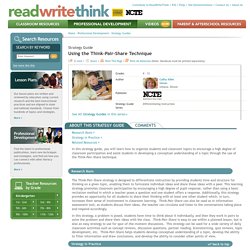
Choose from hundreds of topics and strategies. More Find the latest in professional publications, learn new techniques and strategies, and find out how you can connect with other literacy professionals. More. How to encourage and manage active involvement in group work. Key concepts. In the approach termed Intercomprehension between related languages the learner works on two or more languages of the same linguistic family (Romance, Germanic, Slavic languages, etc.) in parallel.

One of these languages is already known, being either the learner’s mother tongue, or the language of education, or even another language having been learnt previously. In this approach there is a systematic focus on receptive skills, as the development of comprehension is the most tangible way of using the knowledge of a related language to learn a new one. Of course, this does not exclude some added benefits for productive skills. In the second half of the 1990s there was innovative work in this area with adult learners (including university students), in France and other countries speaking romance languages, as well as in Germany, Scandinavian and Slavophone countries.
Many were supported at a European level in the programmes of the European Union. BBC Learning English. BBC Learning English. Pronunciation materials. Integrating pronunciation into classroom activities. In my work as a teacher trainer I have been surprised at how often experienced teachers are reluctant to tackle pronunciation issues in class.
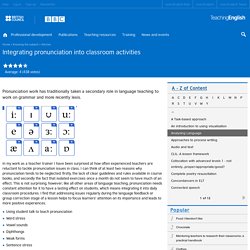
I can think of at least two reasons why pronunciation tends to be neglected: firstly, the lack of clear guidelines and rules available in course books, and secondly the fact that isolated exercises once a month do not seem to have much of an effect. This is not surprising, however; like all other areas of language teaching, pronunciation needs constant attention for it to have a lasting effect on students, which means integrating it into daily classroom procedures. The Pronunciation Blog - Adrian Underhill's Pronunciation Site. Teen angst. Teen Engagement in Learning Starts With Respect. We know that adolescents are acutely aware of when adults are treating them with respect and when they aren't.
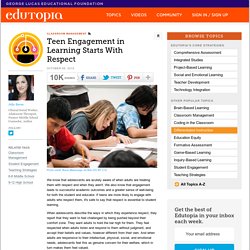
We also know that engagement leads to successful academic outcomes and a greater sense of well-being for both the student and educator. If teens are more likely to engage with adults who respect them, it's safe to say that respect is essential to student learning. When adolescents describe the ways in which they experience respect, they report that they want to feel challenged by being pushed beyond their comfort zone.
They want adults to hold the bar high for them. They feel respected when adults listen and respond to them without judgment, and accept their beliefs and values, however different from their own. Secrets of the teenage brain: a psychologist's guide for teachers. Teenagers think differently to grownups – they are more likely to take risks, be sleepy, misread emotions, give in to peer-pressure and lack self-control.
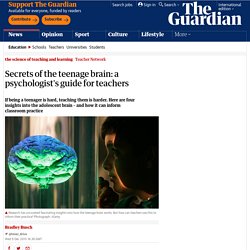
Thanks to advances in technology, we have been able to peer inside the teenage brain and see more clearly how it works. So what have we discovered? And how can teachers use this information to help young people navigate the challenges of growing up and getting an education? Motivating speaking activities. At this age, the learners aren't motivated by new language, they're motivated by an activity.
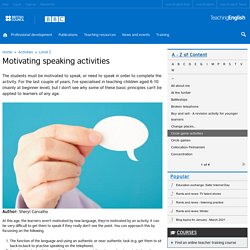
It can be very difficult to get them to speak if they really don't see the point. You can approach this by focussing on the following. Teacher talk - Motivating students. Strategies for Helping Students Motivate Themselves. My previous post reviewed research on extrinsic and intrinsic motivation, and described the four qualities that have been identified as critical to helping students motivate themselves: autonomy, competence, relatedness, and relevance. In this post, I’ll discuss practical classroom strategies to reinforce each of these four qualities.
Autonomy. Motivating teenagers. I will link three practical classroom activities to the ideas of American Psychologist Carl Rogers.
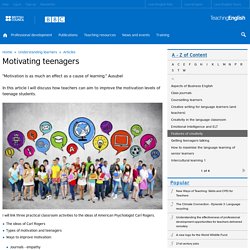
The ideas of Carl Rogers Types of motivation and teenagers Ways to improve motivation:Journals - empathy Using photos - authenticity Music - acceptance The ideas of Carl Rogers Rogers (1957) outlined 3 attitudinal qualities that a teacher, or in his words, a facilitator, should have to assist the learning process. Teaching mixed-ability classes 1. These are several strategies that a teacher can use to deal with this situation.
This is the first of two articles on the topic. The second article covers... Rachael Roberts - Planning for differentiation. About the webinar The session will start by looking at some of the ways in which learners can differ from each other - needs, interests and abilities. We will briefly consider the term 'mixed ability' and why 'differentiation' is becoming more popular, and what exactly it means. We will then explore a range of strategies for differentiating by task, teaching method and outcome. There will be a handout with a summary of practical ideas. About the speaker.
Creative Personalized Learning. Combining voice, choice, and Common Core Personalized learning begins with the learner and means the student drives their learning. To transform a classroom into a personalized learning environment means including student voice and student choice. Student voice is difficult to hear in a traditional classroom where the teacher provides direct instruction and curriculum that is either provided for the teacher, adapted by the teacher, or designed by the teacher.
Student choice means students choose how they learn something and, possibly, what they learn. Tools for Teaching: Managing a Large Class Size. Methodology: teaching large classes. 10 Tips For Teaching Large Classes. 10 Tips For Teaching Large Classes. Creativity in the English language classroom. EFL: Using Roles in Group work. TER S1 P05 0. Using students' first languages in the classroom - UsingEnglish.com.
Why are so Many of our Teachers and Schools so Successful?: John Hattie at TEDxNorrkoping. Digital Learning Futures. Free printable flashcards, matching worksheets, printable bingo cards, printable games, activities, handouts and more. Movie Segments to Assess Grammar Goals. TeachingEnglish. English for kids. Realia. Is an internet connection really necessary in the classroom? Plenary by Joy Egbert. TeachingEnglish. Artist Flash Cards - Famous Painters. Realia: 9 Ways To Bring Real Life Into The Classroom. Worksheets for Kids & Free Printables. TeachingEnglish. By Teachers, For Teachers... LearnEnglish Kids. Flashcard Maker - Create & print flashcards in a flash!
Lexical notebooks or vocabulary cards? TeachingEnglish. TeachingEnglish. Katherine Bilsborough: Lesson plans – less is more. Lesson plan template. Mingling: Terry’s trip. TeachingEnglish. British Council - Lesson plans. Course planning. How to Write a Lesson Plan: 5 Secrets of Writing Fantastic Lesson Plans.